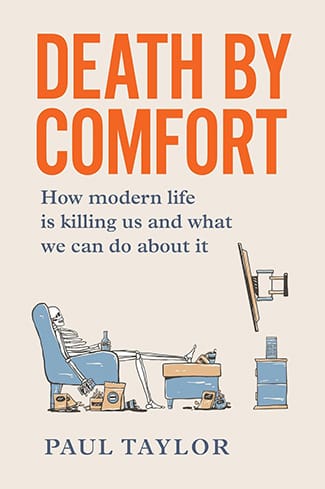What Evolutionary Biology Can Teach Us About Diet, Exercise, and Staying Alive

Explore "exercisebenefits" with insightful episodes like "What Evolutionary Biology Can Teach Us About Diet, Exercise, and Staying Alive", "How to Avoid Death by Comfort", "Exercise for the Brain", "#201 - Deep dive back into Zone 2 | Iñigo San-Millán, Ph.D. (Pt. 2)" and "Ep 132. Fish Guy" from podcasts like ""Plain English with Derek Thompson", "The Art of Manliness", "Psychiatry & Psychotherapy Podcast", "The Peter Attia Drive" and "Sh**ged Married Annoyed"" and more!


Nietzsche's maxim, "What doesn't kill you makes you stronger," isn't just a sound philosophical principle. It's also a certifiable physiological phenomenon; toxins and stressors that could be deadly in large doses, actually improve health and resilience in smaller, intermittent ones. The ironic thing, my guest points out, is that it's the fact that we're not getting enough of this sublethal stress these days that's really doing us in.
Paul Taylor is a former British Royal Navy Aircrew Officer, an exercise physiologist, nutritionist, and neuroscientist, and the author of Death by Comfort: How Modern Life is Killing Us and What We Can Do About It. Today on the show, Paul discusses the science of hormesis, how small doses of intermittent stress can make us more resistant to chronic stress, and why you need to embrace what Paul calls "discomfort harvesting." We talk about some now-familiar topics like fasting and cold and heat exposure with fresh inspiration as to how important they are to practice and how to do them effectively. We discuss how hot a sauna needs to be to get the benefits of heat exposure, Paul's suggestion for how to make an ice bath on the cheap, what may be the single best type of food to eat to improve your gut's microbiome, a form of fasting that's got anti-cancer benefits but is so accessible it won't even feel like fasting, what supplement to take to mitigate the effects of a bad night's sleep, and much more. We end our conversation with how to use what Paul calls a "ritual board" to stick with your healthy habits and resist the "soft underbelly" of modern life.


Exercise is an integral contributor to brain health. Physical activity has been proven to slow the rate of cognitive decline. In this episode, Dr. Puder invites four guests to discuss the importance of incorporating exercise into mental health routines.
Link to blog here.

View the Show Notes Page for This Episode
Become a Member to Receive Exclusive Content
Episode Description:
Iñigo San-Millán is an internationally renowned applied physiologist and a previous guest on The Drive. His research and clinical work focuses on exercise-related metabolism, metabolic health, diabetes, cancer metabolism, nutrition, sports performance, and critical care. In this episode, Iñigo describes how his work with Tour de France winner Tadej Pogačar has provided insights into the amazing potential of elite athletes from a performance and metabolic perspective. He speaks specifically about lactate levels, fat oxidation, how carbohydrates in food can affect our lactate and how equal lactate outputs between an athlete and a metabolically unhealthy individual can mean different things. Next, he discusses how Zone 2 training boosts mitochondrial function and impacts longevity. He explains the different metrics for assessing one’s Zone 2 threshold and describes the optimal dose, frequency, duration, and type of exercise for Zone 2. Additionally, he offers his thoughts on how to incorporate high intensity training (Zone 5) to optimize health, as well as the potential of metformin and NAD to boost mitochondrial health. Finally, he discusses insights he’s gathered from studying the mitochondria of long COVID patients in the ICU.
We discuss:
Sign Up to Receive Peter’s Weekly Newsletter
Connect With Peter on Twitter, Instagram, Facebook and YouTube

Become a member at https://plus.acast.com/s/sma. https://plus.acast.com/s/sma.
Hosted on Acast. See acast.com/privacy for more information.

Which should you do first when you work out -- cardio or weights? How long does it take to get in shape? How long does it take to get out of shape? How important is your form when you run? Does exercise really contribute to fat loss? Does music help or hurt your athletic performance?
These are the kinds of questions folks have about exercise, and have trouble finding good answers to. The advice out there on blogs and magazines is often confusing and contradictory. My guest today set out to cut through the noise by finding the best research-backed answers to these questions and more in his book Which Comes First, Cardio or Weights? Fitness Myths, Training Truths, and Other Surprising Discoveries from the Science of Exercise. His name is Alex Hutchinson, and he started out as a Cambridge-trained physicist and a long-distance runner on the Canadian national team, and is now a journalist and author. Today on the show, Alex walks us through what the scientific literature says about some of the most common fitness and health questions out there. This is a fun and interesting conversation packed with lots of useful insights. Will your own theories and practices be confirmed or challenged? Listen in to find out!
Get the show notes at aom.is/fitnessfaq.

Stay up to date
For any inquiries, please email us at hello@podcastworld.io